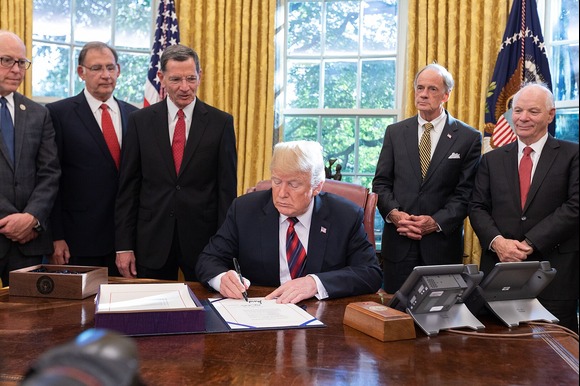In a razor-thin vote, the U.S. House of Representatives passed a wide-ranging tax and spending bill closely aligned with former President Donald Trump’s 2025 policy blueprint. The legislation, while advancing conservative priorities such as tax relief and border security, is projected to add a staggering $3.8 trillion to the national debt over the next decade, according to the nonpartisan Congressional Budget Office (CBO).
The bill includes substantial tax cuts, expanded military and border enforcement funding, and aggressive immigration control measures. It also eliminates clean energy subsidies introduced during President Joe Biden’s administration — a move critics say will set back climate progress. Trump hailed the package as “one big, beautiful bill.”
Passed by a Single Vote, Exposing GOP Divisions
The bill was narrowly approved with a final vote tally of 215–214. All Democratic representatives voted against it, joined by two Republicans, while a third GOP member voted “present.” The result underscored significant divisions within the Republican Party, particularly regarding the bill’s long-term fiscal implications. While the GOP holds a majority in the House, internal disagreements over deficit spending and debt expansion nearly derailed the bill’s passage. It now advances to the Senate, where Republicans hold a 53–47 majority.
Major Provisions of the 1,000-Page Legislation
Key elements of the bill include:
- Extension of the 2017 Trump-era tax cuts for individuals and corporations
- New tax exemptions for tipped income and car loans
- Repeal of clean energy incentives enacted under the Biden administration
- Stricter eligibility requirements for federal food and healthcare assistance
- Massive funding increases for deportation infrastructure, with an annual target of up to 1 million removals
- Recruitment of tens of thousands of additional border agents and immigration enforcement officers
Debt Alarm Bells Ring as Moody’s Issues Downgrade
Despite its ambitious scope, the bill has sparked alarm over its budgetary impact. The CBO’s projection that it will add $3.8 trillion to the federal debt — which currently stands at $36.2 trillion, or 124 percent of GDP — has fueled criticism from both parties and outside analysts. Just last week, Moody’s downgraded the United States’ credit rating, citing unsustainable deficits and growing structural debt burdens as key risks to long-term economic stability.
Supporters within the GOP argued that failure to pass the bill would have triggered automatic tax increases for many American households. They also emphasized the bill’s inclusion of a measure to raise the federal debt ceiling, a step Congress must take by summer to avert a potentially devastating default on U.S. obligations.
GOP Leaders Pledge Revisions in Senate
Republican Representative Stephanie Bice of Oklahoma defended the legislation, calling it essential to economic growth and national stability. “The success of the country depends on it,” she said. “These are pro-growth objectives that the president’s very in favour of, and so we’re moving forward.”
The legislation is not expected to reach the Senate floor until early June. Several top Senate Republicans have signaled their intent to amend the bill significantly before it comes to a final vote, raising the possibility of a contentious reconciliation process between the two chambers.






